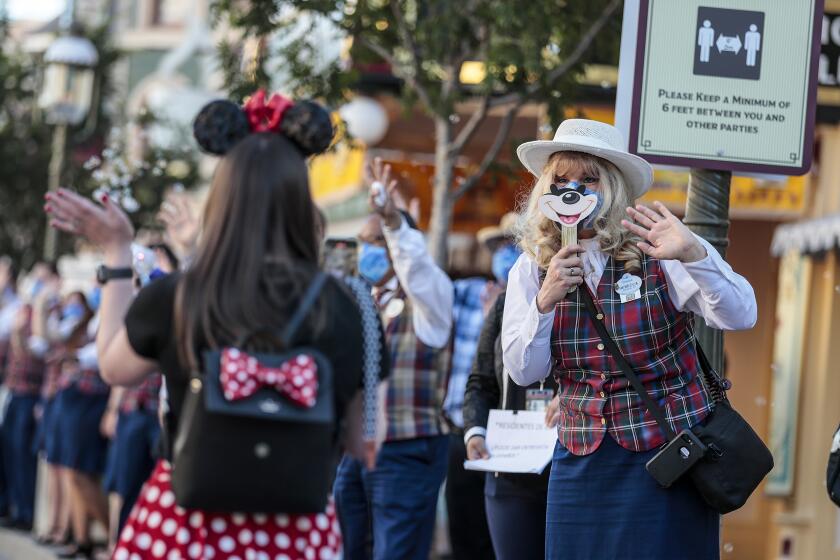Disney workers split on approving first major post-shutdown contract

- Share via
Today marks Mickey Mouse’s 93rd birthday, but not all Disneyland Resort workers woke up in a mood to celebrate.
After months of negotiations, thousands of employees represented by the Master Services Council cast their ballots the day before on a contract primed to raise wages to a minimum of $18.50 an hour by 2023 while providing seniority-based bonuses.
For the record:
1:02 p.m. Dec. 8, 2021A previous version of this story misstated the 2023 wage increase under the contract. It has since been corrected.
When all ballots were tallied, Disney’s California Adventure workers voted to ratify the contract while Disneyland Park workers rejected it, an unprecedented split decision as the two theme parks form separate units.
“We are proud of the tentative agreement we reached with the Master Services Council, which was unanimously endorsed by union leadership,” said a Disneyland official. “We are certainly disappointed in the overall outcome and will continue discussions with union representatives.”
The Master Services Council, which is comprised of four unions, represents 9,500 workers or more than a third of the resort’s post-reopening workforce.
The collective bargaining agreement is the first major one to go before workers since a 14-month pandemic shutdown of the Disneyland Resort sent tens of thousands of them on furlough.
“We have returned more than 25,000 cast members and are hiring hundreds each week,” a Disneyland official added.
It’s also the first split vote since the theme parks became separate units 20 years ago. What that means going forward caused immediate confusion among workers — from ride operators, to bakers, to ticket takers — the following day.
“People don’t know what to think, at this point,” said Michael Wain, a Disneyland custodial worker for 22 years. “How can one park pass the contract but not the other? I don’t know what to think myself. It’s all new to everybody.”
Wain felt torn about the contract but voted against it even as, in his view, the proposed raises were substantial without much in the way of concessions by the unions.
“This is the best contract that I’ve seen in my years working here,” he said. “This is the first time they’ve ever acknowledged senior cast members by giving bonuses. By all means I should’ve been happy and ecstatic. But at the same time, I know people can go to a fast food restaurant and still get a better starting wage than what our cast members are going to make.”
Under the contract, Wain would qualify for a $2,000 bonus as a full-time worker that began his tenure with the company before June 16, 2001. It also offers $1,000 bonuses for those whose start dates are between June 17, 2001 and June 16, 2011 as well as smaller bonuses for senior part-time staff in those same time frames.
The ballot described a “no” vote as one that authorizes the Master Services Council’s bargaining committee to call a strike or take another economic action, if deemed appropriate.
Disney’s California Adventure’s unit, which includes some Downtown Disney union workers, voted to ratify but it remains unclear at the time of this reporting if the split decision affects the contract from taking immediate effect as it otherwise would have.
O.C. Superior Court Judge William Claster found no evidence of a tax rebate subsidy agreement between Disney and the city that would make the law applicable.
David Stilwell, a former SEIU-USWW assistant to the president before retiring in 2016, always wondered when he’d see a House of Mouse divided during his time working on several contract campaigns. In the leadup to Disney’s California Adventure opening to the public 20 years ago on Feb. 8, 2001, he recalled how the two theme parks became separated by more than just an esplanade.
“The company offered to be neutral on the union organizing drives as long as there was the understanding that they would be separate units,” said Stilwell. “That was the devil’s bargain.”
On Nov. 5, the Disneyland Resort and the Master Services Council reached a tentative agreement. Plans for a Nov. 17 union townhall at the Sheraton Park Hotel in Anaheim were scrapped accordingly. The cancelled event had invited Sen. Bernie Sanders, Rep. Lou Correa, longtime labor activist Dolores Huerta and Professor Peter Dreier, who co-authored the 2018 “Working for the Mouse” study that preceded an Anaheim ballot initiative that year aimed at raising wages at the Disneyland Resort, as special guests.
Workers spent the day casting ballots at the Opera House on Main Street U.S.A. within Disneyland, instead.
The three-year contract calls for wages to be raised by a dollar a year through 2023, topping at $18.50 an hour.
Earlier this month, an Orange County Superior Court judge ruled against Disney workers in a class-action suit alleging that the Disneyland Resort violated Anaheim’s subsidy-specific living-wage law and undercut pay.
By comparison, the ordinance proposed a dollar a year increases for all workers, union or not, up to $18 an hour by 2022.
But that was before the pandemic.
Working conditions at Disneyland after reopening from its hiatus on account of the coronavirus may have influenced some no votes. Custodial workers have been tasked with responsibilities that once belonged to a more robustly staffed overnight shift.
“From a custodial standpoint, it has drastically changed,” Wain said. “We’re now coming in approximately three hours before the park opens for one shift and staying three and a half hours after park closing for another. It’s become a lot more labor intensive for us and it’s forcing more people to call out. The callouts have been pretty vicious and we can’t get anybody to hire in.”
The longtime custodian thought Disney’s offer on wages was an attempt to attract more workers, but then his theme park unit voted to reject the contract.
All the latest on Orange County from Orange County.
Get our free TimesOC newsletter.
You may occasionally receive promotional content from the Daily Pilot.







